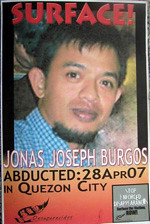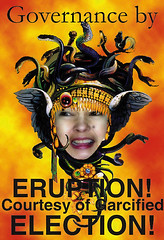Update on Filipino veterans' equity bill
As indicated in an earlier posting, some U.S. veterans/retirees and their dependents/supporters are intent on mobilizing to strongly oppose the passage of S. 1315. -- dcg
In a message dated 6/4/2008 9:10:18 A.M. Pacific Daylight Time, cfcgunnrb29@comcast.net writes:
There was no intent in my original message to deny that the Filipino veterans were not fighting as members of the US Armed Forces. Nor did I say it or imply it. I am well aware of the fact, having been there at the time. I appreciate Filipino, ANZAC, British, Dutch and other veterans just as I appreciate the thousands upon thousands of US fellow citizen veterans who fought in WWII in the Pacific Theater and around the world.
I do know that US citizen veterans of WWII are not authorized a pension unless they are disabled or served for 20 or more years of military service. Therefore, I see no justification in any of the correspondence passing on this issue to pay a pension to a foreign national veteran of WWII. Nowhere in all this "justification" for pensions to Filipino veterans has any proponent shown why they should receive the pension and American veterans should not.
It is particularly galling to find that the nearly Billion dollar funding "found" for these proposed pensions is derived from the VA budget, taken from needy, disabled veterans in our own country when the VA cannot find the funding needed to take care of all the veterans in our own country. There are serious short falls in the VA budget today to properly take care of our own veterans who are fighting the War on Terror. Further, Congress cannot find the funding to keep the healthcare promises made, verbally and documented, to its own military retirees or eliminate the survivor benefit offsets to the widows of these retirees.
Norm Campbell, MSgt, USAF (Retired)
ne obliviscaris (never forget)
In a message dated 6/4/2008 2:28:09 A.M. Pacific Daylight Time, dcgrava writes:
At the outset, may I make clear that I'm not a veteran; nor am I related to a veteran or anyone else who may benefit from this proposed bill should it eventually come to fruition. My participation in this discussion is limited to the fact that I've been furnished a copy of your email messages and that I have strong opinion on some of the points raised.
To my mind the central argument in the opposition against the proposed Filipino Veterans Equity Bill" is supposedly because the Filipino veterans who may benefit from it are not Americans and that the U.S. should take care of its own before anyone else. Never mind that the Filipinos are entitled to it. For example Mr. Campbell stated:
Common sense dictates that the President of the United States would not have ordered Filipino soldiers to fight under the American flag if there was no basis or authority to do so in the first place. The fact is that in the past America was very much in the path of territorial acquisitions. That's the way this country acquired Louisiana from France for $11,250,000; Alaska from Russia for $7,200,000; East Florida, Oregon, and a part of Colorado from Spain; parts of what is Texas, Colorado, Arizona, New Mexico and Wyoming and the whole of California, Nevada and Utah from Mexico for $15 million; the acquisition of Virgin Islands from the Danish Crown for $25 million; and that of the Marshall Islands, Micronesia, Northern Mariana Islands and Palau.
By its own choice and force of superior arms America acquired the Philippines and as a consequence made Filipinos American nationals. After Japan bombed Pearl Harbor, Filipino soldiers were conscripted as legitimate members of the U.S. armed forces and subject to its Articles of War. Thus, with the valiant and loyal help of these fighters America was able to stem the inroads of the enemy in the Far East and kept the U.S. mainland away from the field of the struggle. With the sweats, tears and blood of Filipino soldiers, scouts and guerillas, America was able to recoup early loses, swiftly mobilized and surmounted a difficult war.
However, instead of savoring that hard-earned victory together with their counterparts in the U.S. armed forces, the Filipinos had the nightmare of finding themselves at the receiving end of grossly ungrateful acts. The U.S. Congress passed the Rescission Act of 1946, which stated that the service of the Filipino soldiers were not to be considered "service in the military or national forces of the U.S. or any component thereof" where it relate to the conferring of rights, privileges or benefits. With that single broad discriminatory sweep, the representatives of the American people negate the sufferings and lives lost by those soldiers in the defense of liberty championed by the mother country then, the U.S.A. Additionally, on May 27, 1946, the U.S. Congress enacted the Second Supplemental Surplus Appropriation Rescission Act, which essentially duplicated the language of the First Rescission Act limiting benefits to other Filipino veterans.
Testifying last year before the Senate Committee on Veterans Affairs on the Filipino Veterans Equity Act, Senator Inouye said that Congress took that action "in spite of the fact that Filipino veterans in our armed forces rendered services that were identical to that rendered by other, non-Filipino soldiers who were American nationals or who held United States citizenship. Thus, the Filipino veterans that fought in the service of the United States during World War II are precluded from receiving most veterans' benefits which were available to them before 1946, and which are available to all other veterans of our armed forces regardless of race, national origin, or citizenship status."
The original message being circulated here -- prepared, published, and mailed at taxpayer expense-- states:
The world has since turned over, the cold war is long gone and even former mortal enemies are now solid allies. As the taps and drums continue to mark the passage of once robust and valiant fighters, America, the bulwark among the righteous of nations continue to waffle in its moral obligation to be fair in its dealings with Filipino veterans. The oft repeated alibi of economic squeeze has long since lost its pale considering that in times of bounty, America still failed to make true its promise and obligation.
Obviously the call of the hour is for the passage of subject Equity Bill intended to restore the benefits of Filipino veterans, which were taken from them by the Rescission Act of 1946. America's favorable consideration of their plight even at this late hour of the day would amount to a sincere recognition of their country's steadfastness as a dependable partner in times good or bad and, equally important, an acknowledgement of the Filipino veterans' valuable assistance during that difficult epoch of both our countries' history. They have been in anguish over this undeserved injustice for more than 60 years now and the few of them who are still around -- mostly with failing health and in extreme want -- are in their twilight years. But as the saying goes, better late than never.
Dionesio Grava
Los Angeles
In a message dated 6/2/2008 3:58:49 P.M. Pacific Daylight Time, dale98@tampabay.rr.com writes:
Pass along from Norm Campbell.
My comments to follow shortly.
Jean
Jean D. Beard
Surviving Spouse of: Wiley M. Beard USAF (Ret.)
----- Original Message -----
From: Norman Campbell
Sent: Sunday, June 01, 2008 10:04 AM
Subject: Re: [MRGRG-MS] Fw: [mrgrg-ms-talk] Re: U.S. House of Representatives to Debate a $1 Billion Cut in Wartime Elderly, Poor, Disabled Veterans' Benefits
With all do respect to the Filipino veterans of WWII, there is still no factual justification for the US government to pay them a pension when it does not pay it's own veterans of WWII a pension.
Filner, Akaka and Inouye and others supporting this bill are selecting a single group of WWII veterans to award pensions - foreign nationals at that - then the question becomes, why not include all the veterans of the 11th Airborne, 1st Cav, 13th Air Force, 43rd Inf Div, other units, and the Navy Task Forces involved in liberating the Philippines from the Japanese? Or better yet all US citizen veterans who fought in WWII?
Contrary to a previous statement made that the Filipino veterans should receive the same benefits as other American WWII veterans, implying that the proposed pension to them is given to all WWII veterans simply is not true.
The money to support this bill would be taken away from destitute disabled US veterans out of the VA budget. This at a time when the VA does not have the funds to care for all American veterans and Congress claims there is no money to honor promises to it's own military retirees and widows.
I know of no other veteran group in the US that asks for benefits, promised or not, that would take funding away from other veterans.
Norm Campbell, MSgt, USAF (Retired)
ne obliviscaris (never forget)
*******************************************
Note: This was triggered by an article sent by Dionesio Grava of Rodel Rodis' Telltale Signs/ UNEQUIVOCAL SUPPORT FOR S.1315 NEEDED.
Updated developments as of 2/19/2009:
In a message dated 6/4/2008 9:10:18 A.M. Pacific Daylight Time, cfcgunnrb29@comcast.net writes:
There was no intent in my original message to deny that the Filipino veterans were not fighting as members of the US Armed Forces. Nor did I say it or imply it. I am well aware of the fact, having been there at the time. I appreciate Filipino, ANZAC, British, Dutch and other veterans just as I appreciate the thousands upon thousands of US fellow citizen veterans who fought in WWII in the Pacific Theater and around the world.
I do know that US citizen veterans of WWII are not authorized a pension unless they are disabled or served for 20 or more years of military service. Therefore, I see no justification in any of the correspondence passing on this issue to pay a pension to a foreign national veteran of WWII. Nowhere in all this "justification" for pensions to Filipino veterans has any proponent shown why they should receive the pension and American veterans should not.
It is particularly galling to find that the nearly Billion dollar funding "found" for these proposed pensions is derived from the VA budget, taken from needy, disabled veterans in our own country when the VA cannot find the funding needed to take care of all the veterans in our own country. There are serious short falls in the VA budget today to properly take care of our own veterans who are fighting the War on Terror. Further, Congress cannot find the funding to keep the healthcare promises made, verbally and documented, to its own military retirees or eliminate the survivor benefit offsets to the widows of these retirees.
Norm Campbell, MSgt, USAF (Retired)
ne obliviscaris (never forget)
In a message dated 6/4/2008 2:28:09 A.M. Pacific Daylight Time, dcgrava writes:
At the outset, may I make clear that I'm not a veteran; nor am I related to a veteran or anyone else who may benefit from this proposed bill should it eventually come to fruition. My participation in this discussion is limited to the fact that I've been furnished a copy of your email messages and that I have strong opinion on some of the points raised.
To my mind the central argument in the opposition against the proposed Filipino Veterans Equity Bill" is supposedly because the Filipino veterans who may benefit from it are not Americans and that the U.S. should take care of its own before anyone else. Never mind that the Filipinos are entitled to it. For example Mr. Campbell stated:
Having said all this, I have nothing against the Filipino veteran and I do hope their own government will provide them all with pensions - it's their government's responsibility, not ours. I appreciate their efforts and sacrifices while clearing their own homeland of the Japanese. I landed at Nichols Field outside Manila on a runway of PSP when transferring from China to Tinian during WWII. I saw the devastation of Manila, once called the "Pearl of the Orient." Then it was all part of the war, but looking back it now, the suffering of the Filipinos was a tradgedy...The fallacy of the above statement is that it connotes that the Filipinos at that time were only fighting for the sake of themselves and their country. The fact was that the the territories that later became the Philippines was the responsibility of the United States from the time Spain ceded them for $20 million in the Treaty of Paris of 1898 together with Guam and Puerto Rico. It later became a Commonwealth under the U.S. and with the threat of war with Japan imminent, President Franklin D. Roosevelt, as the Commander-in-Chief of the Armed Forces of the United States, issued on July 26, 1941 a Military Order mandating the Philippine Commonwealth Army into the service of the Armed Forces of the United States. It was attached to a new command created that same day, known as the United States Army Forces Far East (USAFFE) with Lieutenant General Douglas MacArthur as Supreme Commander.
Common sense dictates that the President of the United States would not have ordered Filipino soldiers to fight under the American flag if there was no basis or authority to do so in the first place. The fact is that in the past America was very much in the path of territorial acquisitions. That's the way this country acquired Louisiana from France for $11,250,000; Alaska from Russia for $7,200,000; East Florida, Oregon, and a part of Colorado from Spain; parts of what is Texas, Colorado, Arizona, New Mexico and Wyoming and the whole of California, Nevada and Utah from Mexico for $15 million; the acquisition of Virgin Islands from the Danish Crown for $25 million; and that of the Marshall Islands, Micronesia, Northern Mariana Islands and Palau.
By its own choice and force of superior arms America acquired the Philippines and as a consequence made Filipinos American nationals. After Japan bombed Pearl Harbor, Filipino soldiers were conscripted as legitimate members of the U.S. armed forces and subject to its Articles of War. Thus, with the valiant and loyal help of these fighters America was able to stem the inroads of the enemy in the Far East and kept the U.S. mainland away from the field of the struggle. With the sweats, tears and blood of Filipino soldiers, scouts and guerillas, America was able to recoup early loses, swiftly mobilized and surmounted a difficult war.
However, instead of savoring that hard-earned victory together with their counterparts in the U.S. armed forces, the Filipinos had the nightmare of finding themselves at the receiving end of grossly ungrateful acts. The U.S. Congress passed the Rescission Act of 1946, which stated that the service of the Filipino soldiers were not to be considered "service in the military or national forces of the U.S. or any component thereof" where it relate to the conferring of rights, privileges or benefits. With that single broad discriminatory sweep, the representatives of the American people negate the sufferings and lives lost by those soldiers in the defense of liberty championed by the mother country then, the U.S.A. Additionally, on May 27, 1946, the U.S. Congress enacted the Second Supplemental Surplus Appropriation Rescission Act, which essentially duplicated the language of the First Rescission Act limiting benefits to other Filipino veterans.
Testifying last year before the Senate Committee on Veterans Affairs on the Filipino Veterans Equity Act, Senator Inouye said that Congress took that action "in spite of the fact that Filipino veterans in our armed forces rendered services that were identical to that rendered by other, non-Filipino soldiers who were American nationals or who held United States citizenship. Thus, the Filipino veterans that fought in the service of the United States during World War II are precluded from receiving most veterans' benefits which were available to them before 1946, and which are available to all other veterans of our armed forces regardless of race, national origin, or citizenship status."
The original message being circulated here -- prepared, published, and mailed at taxpayer expense-- states:
The valor and courage of the Philippine Army, which fought alongside U.S. forces to defeat Imperial Japan in World War II, has been demonstrated beyond a shadow of a doubt. However, despite claims to the contrary, no U.S. official during or immediately after the war was authorized to promise benefits to members of this army or to so obligate the U.S. government. When the Philippines became an independent, sovereign nation after the war, the Philippine Army became the responsibility of the new government.As already stated the Filipino veterans were ordered to render service under the American flag while the Philippines was a responsibility of Mother America. What higher authority is there than that of the President of the United States. The Philippines became independent only on July 4, 1946 -- after the war was won.
The world has since turned over, the cold war is long gone and even former mortal enemies are now solid allies. As the taps and drums continue to mark the passage of once robust and valiant fighters, America, the bulwark among the righteous of nations continue to waffle in its moral obligation to be fair in its dealings with Filipino veterans. The oft repeated alibi of economic squeeze has long since lost its pale considering that in times of bounty, America still failed to make true its promise and obligation.
Obviously the call of the hour is for the passage of subject Equity Bill intended to restore the benefits of Filipino veterans, which were taken from them by the Rescission Act of 1946. America's favorable consideration of their plight even at this late hour of the day would amount to a sincere recognition of their country's steadfastness as a dependable partner in times good or bad and, equally important, an acknowledgement of the Filipino veterans' valuable assistance during that difficult epoch of both our countries' history. They have been in anguish over this undeserved injustice for more than 60 years now and the few of them who are still around -- mostly with failing health and in extreme want -- are in their twilight years. But as the saying goes, better late than never.
Dionesio Grava
Los Angeles
In a message dated 6/2/2008 3:58:49 P.M. Pacific Daylight Time, dale98@tampabay.rr.com writes:
Pass along from Norm Campbell.
My comments to follow shortly.
Jean
Jean D. Beard
Surviving Spouse of: Wiley M. Beard USAF (Ret.)
----- Original Message -----
From: Norman Campbell
Sent: Sunday, June 01, 2008 10:04 AM
Subject: Re: [MRGRG-MS] Fw: [mrgrg-ms-talk] Re: U.S. House of Representatives to Debate a $1 Billion Cut in Wartime Elderly, Poor, Disabled Veterans' Benefits
With all do respect to the Filipino veterans of WWII, there is still no factual justification for the US government to pay them a pension when it does not pay it's own veterans of WWII a pension.
Filner, Akaka and Inouye and others supporting this bill are selecting a single group of WWII veterans to award pensions - foreign nationals at that - then the question becomes, why not include all the veterans of the 11th Airborne, 1st Cav, 13th Air Force, 43rd Inf Div, other units, and the Navy Task Forces involved in liberating the Philippines from the Japanese? Or better yet all US citizen veterans who fought in WWII?
Contrary to a previous statement made that the Filipino veterans should receive the same benefits as other American WWII veterans, implying that the proposed pension to them is given to all WWII veterans simply is not true.
The money to support this bill would be taken away from destitute disabled US veterans out of the VA budget. This at a time when the VA does not have the funds to care for all American veterans and Congress claims there is no money to honor promises to it's own military retirees and widows.
I know of no other veteran group in the US that asks for benefits, promised or not, that would take funding away from other veterans.
Norm Campbell, MSgt, USAF (Retired)
ne obliviscaris (never forget)
*******************************************
Note: This was triggered by an article sent by Dionesio Grava of Rodel Rodis' Telltale Signs/ UNEQUIVOCAL SUPPORT FOR S.1315 NEEDED.
Updated developments as of 2/19/2009:
- US Embassy on New Filipino WWII Veterans Benefit
- Coup de grace of the Filipino Veterans Equity Bill
- FilVets Prayer of Thanksgiving
- Filipino veterans and supporters to celebrate in LA

























0 Speak Out:
Post a Comment